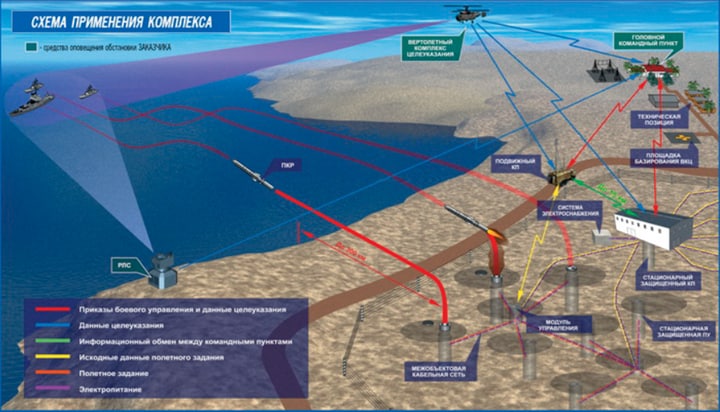On November 8, 2023, Reuters news agency, quoting its own sources, reported that Hizbullah had the Soviet-designed Yakhont universal medium-range anti-ship missile,[1] which, called the P-800 Onix, can be launched from the air, from land, and from underwater. According to the agency, Hizbullah may have acquired the Yakhont from Syria, where its fighters have been fighting on the side of the country's President Bashar Al-Assad and government forces since 2011.

The infographic from the official website[2] of Yakhont manufacturer NPO Mashinostroeniya[3] demonstrates the operations of the Bastion"stationary coastal missile system equipped with a unified Yakhont supersonic homing anti-ship cruise missile. In the image, red lines depict data from combat and homing systems, green lines depict data moving between command points, and blue lines depict the data of land- and air-based homing systems. The missile is designed to engage ships of various classes and types, landing formations, convoys, ship and aircraft carrier strike groups, and land-based targets in conditions of intensive fire and electronic countermeasures.
The first reports of Russian arms supplied to Syria ending up in the hands of Hizbullah appeared in 2006.[4] At that time, Hizbullah had acquired several Russian-made weapons systems supplied to Syria under agreements signed in 1995-1996 and used against Israeli forces during the armed conflict in Lebanon. The systems acquired were the ATGM 9M133 Kornet and 9K115-2 Metis-M, both of which are man-portable anti-tank guided missile systems, and the RPG-29 Vampir, a Soviet reusable RPG launcher. Israel has repeatedly expressed its concern about military cooperation between Moscow and Damascus. In August 2006, according to the Russian Kommersant daily,[5] then Israeli Prime Minister Ehud Olmert informed Russian President Vladimir Putin that Hizbullah was using Russian-made anti-tank weapons that it had obtained from Syria. Journalists said that Israel provided the Kremlin with irrefutable evidence and in response the latter had promised to influence Damascus, though publicly denying the fact. Then Russian Defense Minister Sergei Ivanov stated: "The claims that Hizbullah has Russian 'Kornet' anti-tank systems is complete nonsense. No one has provided us with any evidence of Hizbullah possessing of these systems."[6] He noted that Hizbullah indeed had not only Russian, but also American and even Israeli-made weapons.
Though it is unclear to what degree Russian authorities could control the future of weapons transferred to Al-Assad, the supply of arms continued. In 2010, Russia planned based on a 2007 contract to supply Yakhont missiles to Assad, which again caused concern in Israel.[7] Prime Minister Benjamin Netanyahu asked then prime minister Vladimir Putin to put the deal on hold. The result of the negotiations is unclear, but on February 26, 2011, then Russian Defense Minister Anatoly Serdyukov stated that Russia would fullfil contracts on the Yakhont, supplying 72 missiles in total, including a supply of the K-300P Bastion-P coastal defence missile system.[8] At that time the Stockholm International Peace Research Institute[9] reported that Russia accounted for 71 percent of all Syrian arms supplies.[10] In 2015, Kommersant reported that small arms, grenade launchers, BTR-82A armored personnel carriers, and Ural military trucks had been supplied to Syria.[11]
Some of this equipment requires skilled maintenance. The Yakhont missile system requires an inspection every three years, while the warranty period of the missiles themselves is seven years. If Hizbullah indeed acquired the systems supplied to Syria in 2011, which were likely manufactured probably even earlier, the missiles may be 12 or 13 years old, meaning that even with regular maintenance, the chances of operational failure of these systems are growing.

"All our contacts in the area of military-technical co-operation with the Syrians are absolutely legal. Nevertheless, we take into account the situation in that region and supply them only with weapons that cannot be used against other countries. Believe me: everything they have is aimed solely at protecting their borders and fighting terrorists,"[12] said then general director of "Rosoboronexport"Anatoly Isaikin. Rosoboronexport is a state company tasked with exporting weapons, dual-use products, and related services and technologies. (Source: TKB.RF).
So, the Yakhont systems that are in the service of the Syrian military may have ended up in the hands of Hizbullah, though Presidential Administration Press Secretary Dmitry Peskov firmly denied claims of a direct transfer of arms to the Shi'ite militant group,[13] with media supporting the "general party-line." The Izvestia daily, quoting a source "close to Hizbullah's political leadership" wrote on November 10, 2023: "This kind of publication can be percieved as intimidation on the part of the United States and as an attempt to demonize the Lebanese paramilitary party. The Americans used exactly the same strategy in Iraq as an excuse to justify their invasion in 2003."[14]
The veracity of Moscow's claims is unclear, as photos and video of Russian-produced weapons under Hizbullah control are disseminated on social media. Despite the November 10 claims of Russian Defense Minister Ivanov on the "Operation Z: Military Correspondents of the Russian Spring" Telegram channel posted[15] a video of the destruction of an Israeli M113 APC with a Kornet anti-tank system by Hizbullah. So it is possible that Hizbullah has the Yakhont or another similar type of missile.

SUPPORT OUR WORK

Though the Kremlin is not the only supplier of arms to Assad's regime – China, North Korea, and Belarus also provide arms to the Syrian president – it is probably the main one. While it is hard to tell to what extent the Russian authorities can influence the arms already transferred to the Syrian regime, there is no doubt that the authorities are aware of Israel's concerns, which have been reiterated many times. The abundance of arms in Syria – over the years more than $2.2 billion worth of military equipment has been imported into the country –has facilitated the emergence of a grey and black arms market,[16] which may be a source of illegal arms for Hizbullah.
[1] Reuters.com/world/middle-east/hezbollahs-anti-ship-missiles-bolster-its-threat-us-navy-2023-11-08/
[2] Npomash.ru/activities/ru/missile3.htm
[3] Npomash.ru/activities/ru/missile3.htm
[4] Wherein, military cooperation between the USSR and the Syrian Arab Republic dates back to 1980, when the 'Treaty of friendship and cooperation' between the two countries was signed. The supplies surged back in 2015 when the said traety was renewed. (rbc.ru/politics/09/09/2015/55f057fa9a79477224e62a06)
[5] Kommersant.ru/doc/708257
[6] Kommersant.ru/doc/703330
[7] Lenta.ru/news/2010/09/17/rocket/
[8] Ria.ru/20110226/339201737.html
[9] Stockholm International Peace Research Institute.
[10] Sipri.org/sites/default/files/2023-06/yb23_summary_en_1.pdf
[11] Kommersant.ru/doc/2806541
[12] Kommersant.ru/doc/2707945
[13] Gazeta.ru/politics/news/2023/11/03/21636055.shtml?updated
[14] Iz.ru/1602821/andrei-krasnobaev-prokhor-dorenko/pritcely-na-rasstoianii-est-li-u-khezbolly-rossiiskie-rakety-iakhont
[15] T.me/RVvoenkor/54641
[16] See for example: gjia.georgetown.edu/2019/09/02/the-arms-trade-and-syria/; armscontrol.org/act/2012-05/urgent-need-arms-trade-treaty.




